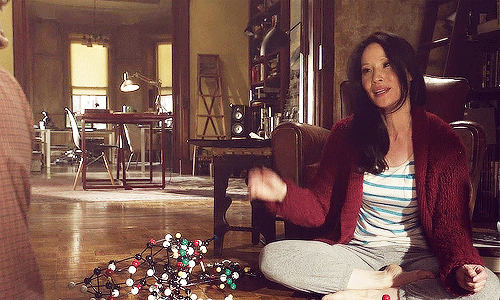If you take anything from the articles we've posted this month on what it means to be an Asian-American strong female character, I hope it's the complexity inherent in even considering the question. For all that we as a culture like to reduce "Asia" into a vague notion of East Asian cultures all blended together, Mt. Fuji rising over the Great Wall of China, the truth is that Asia is huge and Asian-American is a very very broad term.
In trying to work through the stereotypes associated with it, then, we have to admit this broadness and look at the multifaceted ways the Asian-American community is seen in the United States. More importantly, we have to look at how this diversity is often blurred over by the media, taking narratives that should get more time and space and reducing them to "best friend" stories or making a character's entire arc actually about her white dad. Then again, there is space to recognize the shows and characters who do get it right, showing best friends who become integral parts of the narrative and characters whose arcs and heritage become the spine of the entire show.
To talk about Asian-American stereotypes is to discuss an entire world of issues, from stories about "tiger moms" and "blushing geishas" to portrayals of "harem girls" and "burkas". If you take nothing else from our writings this month, I hope you at least get that Asia is a very big place.
 But I want you to get something more too. For all that advocating for social change through changes to our cultural products and media feels often like a Sisyphean task, it's important to remember that speaking out about this problems does work. It does! Definitely not as quickly or effectively as we all would like, but you can't deny the value and importance of greater understanding.
But I want you to get something more too. For all that advocating for social change through changes to our cultural products and media feels often like a Sisyphean task, it's important to remember that speaking out about this problems does work. It does! Definitely not as quickly or effectively as we all would like, but you can't deny the value and importance of greater understanding.This month we also saw movements like #whitewashedOUT, where Asian-American media commentators and advocates discussed the horrible issues of whitewashing in mainstream American media. We saw awesome twitter trends like #StarringJohnCho and #StarringConstanceWu, that reimagined mainstream Hollywood hits as being vehicles to star Asian-American actors. And these stories, though seemingly superficial and only based on "raising awareness", have caused nation-wide conversations. Talking about it is, as it turns out, one of the best things we can do.
So let's talk about one more. Let's talk about the rare case of a character who, well, got it right. Of a show that tried really hard to do the right thing and succeeded. Of a character who is inspirational while also being flawed, who is a brilliant over-achiever but also still a human being, who always looks like she walked off the pages of a fashion magazine but needs three alarms to get up in the morning. Let's talk about Dr. Joan Watson.
Dr. Joan Watson (Lucy Liu) is, as a point of fact, the first character we really meet in Elementary. And contrary to prior incarnations of the Sherlock Holmes stories, she's not there to ooh and ahh at Sherlock's brilliance. Instead, within our first scene of meeting her, dominance is established and it's not Sherlock holding the reins.
No, disrupting the usual order of both Sherlock Holmes adaptations and society in general, it's Joan who runs this show. She comes on not as a curious bystander but because she has a job to do: she's been hired to act as Sherlock's (Johnny Lee Miller) sober companion for six weeks as he readjusts to life outside of the rehab he was in for heroin addiction.
She's there to make sure he doesn't do drugs or fall back into bad habits, but it turns out that Joan has a lot to contribute to Sherlock's crime solving too. An accomplished surgeon who left the medical field after losing a patient, Joan quickly establishes herself as a great resource for Sherlock and he starts finding reasons to bring her to every crime scene.
But the real strength of their relationship comes not from Joan's additions to Sherlock's medical knowledge. No, the reason we the audience fell in love with Joan and the reason Elementary isn't just one more show about a brilliant jerkass pissing people off and being right all the time, is that from the get-go, Joan sets boundaries and parameters for appropriate behavior. She stands up for Sherlock, smacks him down when he's inappropriate, and generally enforces the idea that part of recovery, part of solving crimes, and part of being a damn human being is basic compassion and empathy. And that being smart doesn't give you a free pass to ignore that.
This is Joan's role on the show and this is what makes her not just a fantastic female character but an amazing subversion of the normal tropes dogging Asian-American women in media. She is the arbiter of good behavior, not in a way that means she's "mom-ing" everyone or in the sense that she's a nagging, shrill wife figure.
No, Joan is nobody's mommy - but she's a professional who believes in caring for people. She's not touchy-feely, but that doesn't mean she can't value kindness. So even as Joan transitions from being Sherlock's companion to being his apprentice to being his partner, she remains an equal emotionally. She's treated with respect and she demands it from those who see her as lesser. That is Joan's legacy, and that's why we've left her for last.
Asia is a very big place and stereotypes about Asian women are wide and varied. But there is one thing that all the stereotypes seem to agree on, even when they contradict elsewhere. We seem to hold a pervasive belief that Asian women must be either meek and submissive or shrill and demanding. There is no middle-ground in our cultural understanding. You can be one or the other, and on a bad day you can be both. But there is no option here for an Asian woman who stands up for herself calmly and reasonably and is respected for doing so. Except Joan.
 Well, okay, there are lots of other examples sprinkled throughout our pop culture, but Joan really does stand out as a benchmark character, alongside other such breakthroughs as Jessica Huang and Kamala Khan. She's a woman who stands up for herself and is rewarded by the narrative for doing so. In fact, the more Joan comes into herself, the more the narrative rewards her.
Well, okay, there are lots of other examples sprinkled throughout our pop culture, but Joan really does stand out as a benchmark character, alongside other such breakthroughs as Jessica Huang and Kamala Khan. She's a woman who stands up for herself and is rewarded by the narrative for doing so. In fact, the more Joan comes into herself, the more the narrative rewards her. Her first actions on the show are to establish her boundaries and make sure that Sherlock respects them - on your average show like this that would mean Joan is a mean no-fun character who we're supposed to hate. But here, Joan is right. Sherlock is wrong. And he learns from her.
This is significant in any case but especially significant given their respective races and positions in society. Joan is an Asian-American woman, raised middle-class, who has a high level of education but lacks the financial and cultural resources of some of her peers. Sherlock, on the other hand, is an able-bodied white man from a wealthy background, whose resources mean living rent-free in a brownstone in New York City. Their lives are pretty different, and we are encouraged by society to judge them according to that.
The fact, then, that Joan is in a position of authority over Sherlock means a lot. It's a big step forward for Asian-American women on television. Even more, she retains this respect and feeling of authority even as her role switches with Sherlock's and she becomes his student. She's still a respected and necessary character on the show and in Sherlock's life. That matters. In a season when Sleepy Hollow can get renewed even after killing off its female lead, it means a lot to understand that without Joan there is no Elementary - it's not even worth trying.
Even better, Joan is defined in the show entirely by her own actions. She's not Sherlock's love interest - the writers of the show insist that they have no intention of ever going there. She's not his sidekick - by the fourth season, she is actually the NYPD's preferred contact. And she's not falling back on this career because nothing else worked out - Joan is a phenomenal surgeon, a requested and respected sober companion, and the kind of brilliant where she could do pretty much whatever she wants.
She's an equal.
 There is so much more I could say about Joan, but I think you've got the gist by now. Joan is an Asian-American woman whose life realistically includes struggles and problems we can all relate to: her mother worries that her job is beneath her, she hates getting up in the morning, and she has trouble establishing work-life balance. But she's also a firmly Asian-American woman, who regrets not knowing Mandarin better, who has to deal with racist assholes questioning her skills, and who still feels the weight of the immigrant experience even having been born in the US.
There is so much more I could say about Joan, but I think you've got the gist by now. Joan is an Asian-American woman whose life realistically includes struggles and problems we can all relate to: her mother worries that her job is beneath her, she hates getting up in the morning, and she has trouble establishing work-life balance. But she's also a firmly Asian-American woman, who regrets not knowing Mandarin better, who has to deal with racist assholes questioning her skills, and who still feels the weight of the immigrant experience even having been born in the US. Joan is all of these things while also being a woman who pushes back against stereotypes about Asian women who don't speak up for themselves. She's outspoken but not "shrill", she's calm but not meek. She has a clear sense of what is and is not appropriate and she does not hesitate to speak out against injustice. She's a reminder of the awesome stories we can tell when we take the time to actually write Asian-American women as people.
Basically, Dr. Joan Watson is the kind of representation we want. She's complex, engaging, funny, sad, competent, flawed, and painfully aware of herself at times. She's a person, the kind of person you wish you were lucky enough to meet in the real world. Yes, she's the best of us, a high bar to live up to, but she's an example of what you get when a show really genuinely wants to do a good job. It makes characters like Joan, Asian-American representation that doesn't just ignore stereotypes, it pushes through them and comes out the other side, nuanced and healthy and ready to take on the world.
More please.
 |
| Also she's adorable. |



Her first actions on the show are to establish her boundaries and make sure that Sherlock respects them - on your average show like this that would mean Joan is a mean no-fun character who we're supposed to hate. But here, Joan is right.
ReplyDeleteIn particular, Joan is willing to be flexible about boundaries when necessary - but Sherlock and his whims don't get to define that necessity. The nature of his work is one thing she's willing to work around, because it deals with stakes of life and death - something that won't be case for most clients - and something important enough to take into account. But she still sets the limits of just how much account is needed.
She stands up for Sherlock, smacks him down when he's inappropriate, and generally enforces the idea that part of recovery, part of solving crimes, and part of being a damn human being is basic compassion and empathy.
Moriarty's downfall is usually interpreted as because of her being in love with Sherlock, but I see it - or the important part of it - a little differently. It might be love, respect, regret, any number of things, but the important part is that she'd feel the need to try to justify herself to Sherlock, and expose herself to do so. And it's the perfect clue for Joan to be able to spot rather than Sherlock - not just emotion over logic (which is well overused in Sherlock Holmes takes these days), but the ability to spot a rationaliser.
Considering what Moriarty did to him, it's good that he got to make the triumphant speech, but even better that "Turns out there were two" was one of its turning points.
One of my other favourite scenes was when Sherlock gives a very complete - and obviously rehearsed - speech to Joan's family about the value of her companion work, and how it's no lesser than her surgery. Finally giving voice to everything he thinks of her, even if leaving himself the capacity to walk it back once they're alone.
Thanks blogger for sharing the best article. https://framaroot.xyz/apk/ https://pingpongroot.pro/apk/ https://rootmaster.pro/apk/
ReplyDeletekolkata call girls stand in night
ReplyDeletepark street kolkata call girls
cheapest call girls in kolkata
kolkata escorts
escorts in kolkata
kolkata escorts service
escorts kolkata
escorts service in kolkata
escorts services in kolkata
female escorts in kolkata
foreign escorts kolkata
low cost escorts in kolkata
KOLKATA ESCORTS
ReplyDeleteKOLKATA ESCORT
KOLKATA ESCORT SERVICE
KOLKATA INDEPENDENT ESCORTS
KOLKATA INDEPENDENT ESCORT
ESCORT IN KOLKATA
ESCORTS IN KOLKATA
VILLAGE CALL GIRLS
VILLAGE CALL GIRL
CALL GIRL
CALL GIRLS
ESCORT
ESCORTS
KOLKATA FEMALE ESCORTS
KOLKATA HOTEL ESCORTS
KOLKATA MODEL ESCORTS
KOLKATA CALL GIRL
KOLKATA CALL GIRL SERVICE
KOLKATA CALL GIRL SERVICE
KOLKATA CALL GIRLS
CALL GIRL
CALL GIRLS
CALL GIRLS SERVICE
CALL GIRL SERVICE
KOLKATA INDEPENDENT CALL GIRLS
KOLKATA INDEPENDENT CALL GIRL
ESCORT
เบื่อเมื่อไหร่มาลองเล่นสล็อต xo เกมสล็อตออนไลน์ slotxo เล่นได้ไม่มีวันเบื่อ
ReplyDeletehttps://www.slotxd.com/slotxo
When you make gratitude the focus of your daily interactions with others
ReplyDeleteFLVS login
M4UFree-Watch Free Illegal HD Movies
SAP Software
aol mail login site
An intriguing discussion may be worth comment. I’m sure you should write much more about this topic, may well be described as a taboo subject but generally folks are too little to chat on such topics. An additional. Cheers 메이저토토사이트
ReplyDelete